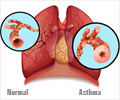Omega-3 oil supplementation during pregnancy reduces the risk of asthma, wheezing, and lower respiratory tract infections in children.

- Omega-3 fatty acids reduce the production of antibodies that cause allergic reaction and asthma symptoms.
- Diet deficient in omega-3 during pregnancy is associated with increased risk of asthma and wheezing disorders in children.
- Omega-3 supplements during pregnancy reduce wheezing and asthma in children.
The yearly prevalence of persistent wheeze or asthma was lower among the children of mothers who received supplementation, and this effect did not appear to change between the ages of 2 and 5 years.
The risk of persistent wheeze or asthma was reduced by approximately 7 percentage points, or one third, in the first 5 years of life among children of women who received daily supplementation with n−3 LCPUFA (Long chain polyunsaturated fatty acid) during the third trimester of pregnancy. This effect was most prominent among children of women with low pre-intervention EPA and DHA (EPA and DHA are fish-derived omega-3 fatty acids) blood levels. Supplementation was also associated with a reduced risk of infections of the lower respiratory tract but not with a reduced risk of eczema, or allergic sensitization.
The review published in the Journal of Allergy and Clinical Immunology: In Practice examined two articles. The New England Journal of Medicine study included 346 pregnant women in their 3d trimester who took omega-3 fatty acids daily and 349 who took a placebo. The investigators also divided the trial population into three groups based on their blood levels of omega-3 fatty acids. The population with the lowest blood levels benefited the most from fish oil supplementation.
Among pregnant women in their 3rd trimester into fish oil, placebo and "no oil" groups. The fish oil group took omega-3 fatty acids daily as did the placebo (olive oil) group. The "no oil" group was informed of the trial proposal and therefore could consume fish oil or fish during the 3rd trimester if they chose to do so. Researchers found the fish oil and the "no oil" groups took less asthma medication as they aged to 24 years old, inferring both groups developed less asthma.
Omega-3 Goodness
"Omega-3 fatty acids cannot be synthesized by humans and therefore are essential nutrients which are derived exclusively from marine sources," said Lin. "It may be premature to recommend daily high dose fish oil supplementation during the 3rd trimester."
In conclusion, these findings show that omega-3 supplementation during pregnancy was associated with a significantly diminished burden of wheezing and asthma in children.
- Hans Bisgaard, Jakob Stokholm et al. Fish Oil–Derived Fatty Acids in Pregnancy and Wheeze and Asthma in Offspring, The New England Journal of MedicineDOI: 10.1056/NEJMoa1503734
Source-Eurekalert















